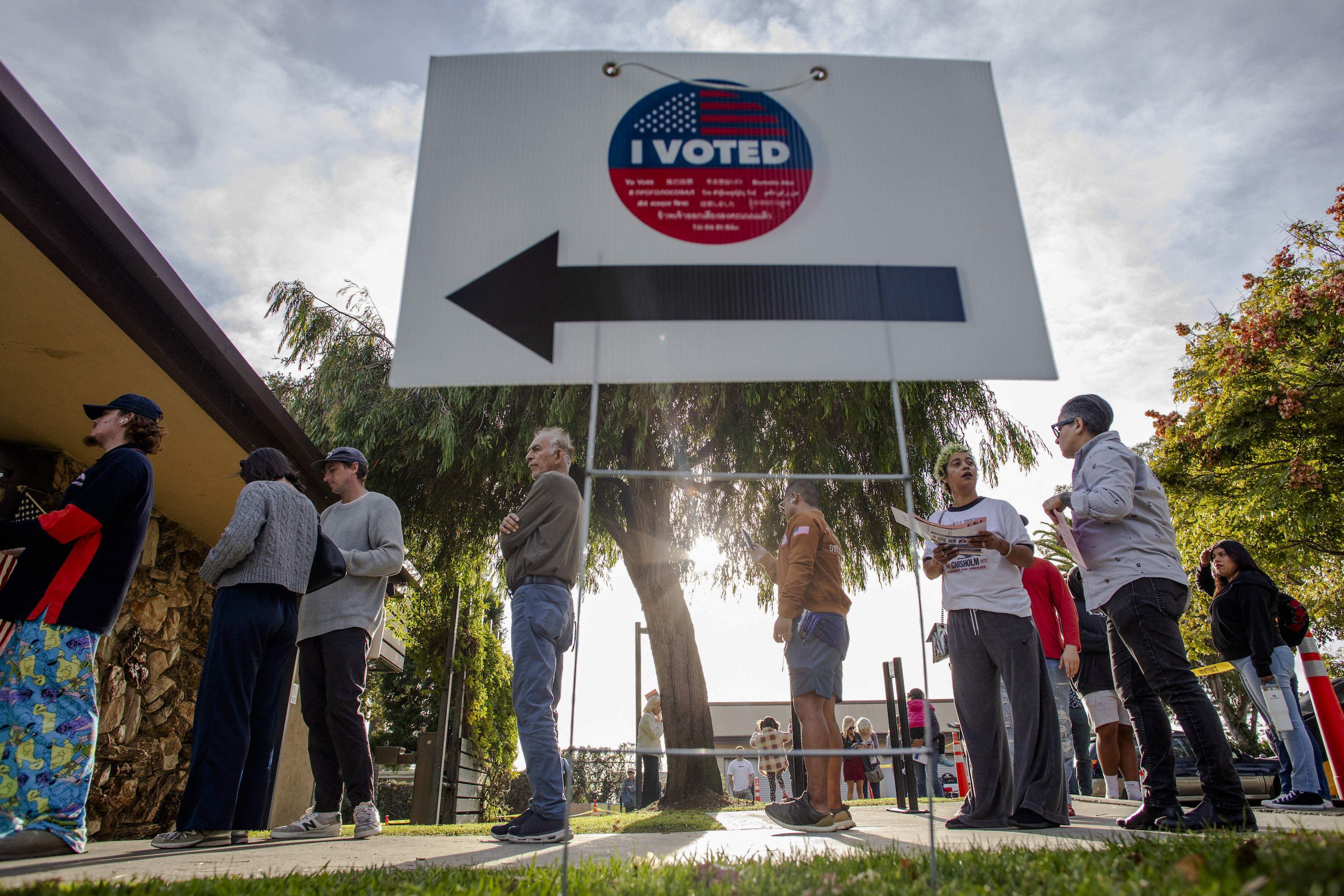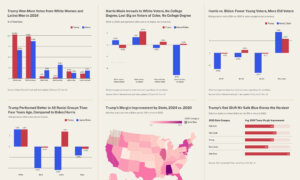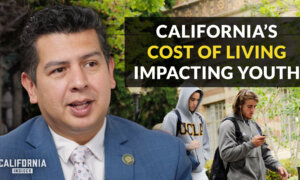According to exit polling data, President-elect Donald Trump won the White House on Nov. 5 thanks in part to a massive improvement in his performance with Latino voters and younger voters.
On Nov. 5, the National Election Pool (NEP) exit poll conducted by Edison Research surveyed more than 22,800 voters as they left the polls in Arizona, Florida, Georgia, Michigan, Nevada, North Carolina, Ohio, Pennsylvania, Texas, and Wisconsin.
Those figures are a snapshot of the electorate that overwhelmingly chose Trump and sent control of the Senate back to the Republican Party.
Latino Support Helps Trump
Nationally, Trump won about 45 percent of the Latino vote, according to the exit polling. While he lost to Vice President Kamala Harris with the racial group that makes up as much as 13 percent of the electorate, he performed significantly better with Latino voters in this election than he did in 2020.
According to the NEP exit poll, Trump shrunk his disadvantage to the Democratic Party candidate among Latino voters by 13 percentage points between 2020 and 2024.
In every state with large Latino populations—Arizona, Florida, Nevada, and Texas—Trump performed better with this ethnic group this time around than he did in 2020. In Nevada, Trump and Harris split the Latino vote, with both winning 47 percent.
Following the shift in racial support, according to the NEP’s totals, Trump won 54 percent of the vote from Latino men. That was an 18 percentage point improvement over 2020.
Conversely, Trump lost ground with white voters and gained nothing with black voters. According to the national exit polling, Trump won 55 percent of the white vote, but he performed 3 percentage points worse with this racial group than he did in 2020. Harris dominated the black vote, winning 86 percent of those ballots.
Trump handily won the vote among white men, 59 percent to Harris’s 39 percent, although his percentage was 2 points less in that group than in 2020. Likewise, Trump prevailed among white women 52 percent to 47 percent, a decrease for him of 3 points from 2020.
In Pennsylvania, the battleground state that handed the former president an Electoral College victory early on Nov. 6, Trump won 55 percent of the white vote but performed 2 percentage points worse than he did in 2020, when then-presidential candidate Joe Biden carried the Keystone State.
One Latino voter who spoke with The Epoch Times near his polling site in Richmond, Virginia, said he backed Trump because the U.S. needs an aggressive leader.
Jorge Balcaceres, 63, a cargo delivery man originally from El Salvador, said his reason for voting for Trump was that the county would need a leader who’s “really, really strong.”
“A very tight ruler right here in the United States, so nobody plays with this country,” he told The Epoch Times.
He said he is also frustrated with illegal immigrants crossing the border. According to him, Chesterfield County, where his precinct is located, used to be peaceful, but now, there are “a lot of bad people right here,” he said.
“They don’t want to work; they want everything for free,” he said, adding that all taxpayers are footing the bills for the illegal immigrants.
Policy Considerations
Heading into the election, many public opinion polls showed that voters considered the economy the most important issue in the presidential election. According to a Gallup poll published on Oct. 9, the economy, the future of democracy in the United States, and national security were the top three issues.
Democratic Party candidates and Republicans diverged their campaign messaging on issues that voters considered secondary. Republicans focused on border security and illegal immigration—the latter an issue that voters ranked as the fifth most important one in 2020—while Democrats spotlighted abortion access.
Public opinion polling ahead of the election showed that Americans considered abortion to be the ninth most important issue.
Financially, 45 percent of respondents told exit pollsters they were doing “worse” in 2024 than in 2020. Trump won 80 percent of these respondents’ votes.
Respondents were split on the top two issues. Thirty-five percent of respondents ranked the future of democracy as their top election issue, while 31 percent ranked the economy as their key concern.
Harris dominated with voters who identified “democracy” as their most important issue, by a 64 percentage-point margin. Conversely, Trump ran the table with voters who said the economy was the most influential factor in their vote. Those voters broke for Trump by a 59 percentage-point margin.
Young Men Back Trump
The gender divide on political issues remains strong in the United States.
Overall, according to national exit polling, men tended to vote for Trump, and women tended to vote for Harris. Each candidate won the gender category by a 10 percentage-point margin and saw their support grow. Trump saw a 1 percentage-point improvement with men, while Harris saw a 2 percentage-point gain with women.
Nationally, Trump saw his support among young men, young women, and women between the ages of 45 and 64 grow between 2020 and 2024.
Trump won the biggest gain among men between the ages of 18 and 29. Harris actually won the vote with that segment of the population, with 49 percent of their support, but Trump’s performance improved by 6 percentage points among young men.
Trump performed better with women aged 45 to 64 and women aged 18 to 29 in 2024 than he did in 2020. He saw a 5 percentage-point and 4 percentage-point improvement with those groups, respectively.
Trump won 54 percent of the vote from respondents who said they were casting a ballot for the first time in 2024. That was a 22 percentage-point improvement over his performance with that group in 2020.
Education and Wealth
In 2024, according to the exit polling, Trump won 54 percent of the vote from Americans who do not have a college degree. That was a 4 percentage-point gain from 2020. However, Harris won 57 percent of the vote among those who said they have a college degree. That was actually 2 percentage points worse than Biden did with the same cohort in 2020.
By income, Americans making less than $50,000 per year tended to vote for Trump. According to exit polling, Trump won 49 percent of that vote in this election, a 5-point improvement over 2020. Meanwhile, Harris won with Americans making more than $50,000 a year. Fifty percent of those voters broke her way in 2024.





















